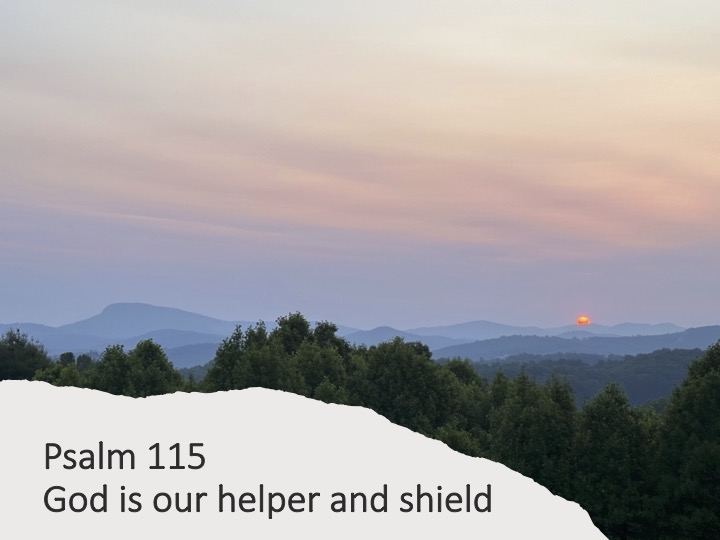Jeff Garrison
Bluemont and Mayberry Churches
June 11, 2023
Psalm 115
At the beginning of worship
When your neighbor is successful, do you ask him or her about their secret? You know, as humans, we’re often curious. That can be a good thing. It may help us become a better person. I’ve seen articles on the books Oprah, Warren Buffett, Elon Musk, Bill Gates, and other financially successful individuals read. Maybe it will work for us, we think as we read the same books. Let me suggest that’s okay, up to a point.
Now comes the warning. Don’t ever think that just because of someone is successful, they are closer to God. Nor should we take religious advice from someone based solely on their bank account. We must remember our God delights working with the underdog. Jesus repeatedly speaks of reversing the economic order, where the last are first, the servant and the poor are elevated to positions of power and glory.[1] This morning, think about what this means for us?
Before the reading of scripture
During the season of Easter, I based my preaching on a series of praise Psalms I thought reflected the joy and hope fitting the season. But there was another Psalm I thought about trying to work into the series. I couldn’t fit in. Yet Psalm 115 kept coming back to me. I decided to preach on it today. Next Sunday, I plan to move to the New Testament and begin to work our way through 2nd Corinthians.
If your Bible has textual notes, you may learn that in many older manuscripts, this Psalm was connected to the previous Psalm, 114. That Psalm doesn’t seem to have as much meaning as 115. It recalls the wonders of what God did for the Israelites during the Exodus. Of course, we need to know God’s work, but that’s all you get in 114. You don’t even have a call for the people to praise, just a recounting of God’s action and a warning to fear the Lord. Psalm 114 reminds Israel of what they’re not to claim credit.
Psalm 115 begins with a reminder for Israel to give God the credit. In other words, be humble and don’t think you’re responsible for your good fortune. Such humility is a sign of one who trust in God.
Read Psalm 115.
Think about the times you’ve felt pride swell up in you. How did you feel when you first mastered riding a bike? Or swimming? Or building your first birdhouse. You know those things you showed off to your friends during show-and-tell.
Speaking of show-in-tell… I don’t remember much about shop in Junior High, except for one thing. I designed and built a desktop bookcase. It’s simple. I probably worked on it for two class periods, maybe four with the staining and varnishing. But it was mine. For years, it sat on my desk and held dictionaries and a Thesaurus. Then computers came along, and the monitor replaced it. I moved it to the top of a file cabinets. Today, fifty-some years later, it’s on a shelf in my office at Bluemont. It holds books I’m waiting to read.
What are you proud of? Maybe turning a double play in Little League or throwing a touchdown pass when playing high school football. Or, for the studious among us, it might have been making the honor roll. I wouldn’t know anything about that (it wasn’t until college that I made the Dean’s list).
Or our pride can be puffed up with a reward at work. I know my ego about burst when we moved into new church campuses in the congregations I served in Utah and Michigan.
Tempering our pride
But with all these examples, if we think about how they were accomplished, it should temper our pride. After all, where would we have been without a parent to teach us to ride a bike? Or teachers to show us how to swim or build something from wood? Or coaches to encourage us? And for the big stuff, we seldom do it alone. We depend on others to do their part.
And we must ask, who gave us the abilities we need to do accomplish what we do? If we were born without arms, there would have been no double plays or even woodworking. If no one joined in helping us, there would be no new buildings or other major accomplishments. And finally, for everything we do, we owe a debt to God. Very few things we can claim for our own. This is why our Psalm begins with a negation. Let’s not praise ourselves. Let’s give credit to God, whose love and faithfulness allows us success.
The concern of the Psalmist
But then, in the second verse, we understand the reason behind the Psalmist concern. The nations taunt Israel. “Let us see your God,” they ask. This was a real problem for a small nation like Israel who worshipped an unseen God. There more powerful neighbors pushed them around. Now they want to see the God Israel worships. A problem in Israel’s history is her own citizens looked to their neighbors and their gods and wondered if they are worshipping the wrong God. It’s kind of like us trying to find the secret for success from someone else, as I suggested at the beginning of worship.
The psalmist tries to nip this tendency to look with envy upon their neighbors in the bud. He provides a statement of faith. “Our God is in the heavens; he does whatever he pleases.” Israel has no control over their God. There is a profound truth here. If we can control God, we are not worshipping the true God; for we are creatures, created by the Almighty. We worship the God who created heaven and earth and who is active in the affairs on earth,[2] especially with the powerless and the weak.
A satirical caricature
At this point, the psalmist creates a satirical caricature of the gods of the nations who have been created by human hands.[3]In a poetic yet humorous way, he describes these gods who some mistakenly believe give their neighboring countries such strength and power. The idols of other nations depict gods with human attributes—mouths, eyes, ears, noses, hands, feet, throats. Of course, none of these attribute’s work! While we can see an idol, it can’t do anything else for us. As humans, if we can control or make a god, it’s not the Lord Almighty.
You’re no better than that which you worship
In verse 8, after describing such idols, the psalmist polemic turns to those who worship them. Those who trust idols are not better than the statues they worship. I suggest this is true for the idols we worship.
A three-fold call and blessing
Then, in the next verse, the psalmist issues a call to the Hebrew people to trust in their Lord, their help and shield. He issues a three-fold call: for Israel, for the house of Aaron or the priesthood, and for all (great and small) who fear the Lord. Here, it appears the Psalm includes not just those who are children of Abraham, but others who also worship the Lord.[4]
The psalmist follows his three-fold call to trust in God with a three-fold blessing from God. The God who created heaven and earth is faithful to those who honor him.
God created two domains
In verse 16, we learn that God has created two domains. Heaven is for the Lord; the earth is for us. Of course, this does not mean that God is not present on earth, for it all belongs to God. And God can reveal himself at any time, as he did over and over in Scripture[5] and more fully in Jesus Christ.
A hint of resurrection?
Verse 16 sounds obvious but also negative. “The dead do not praise the Lord.” Yet it is followed by a statement that we will bless the Lord from here on out. Obviously, if we are to continue to bless the Lord after we die, God’s must intervene. This is beyond the Old Testament view of God but is the truth we discover in Jesus Christ.[6] God, through Jesus, defeated death and promises us eternal life.
Do not covet
This Psalm reminds us to be content and to trust God. We shouldn’t crave what we think makes our neighbors successful. Perhaps this is a reason for the 10th Commandment: “You shall not covet your neighbor’s house…”[7] Instead of finding ourselves by comparing us to others, we find ourselves in God’s family. While God may reside in heaven, God is also all around us. God came to us in Jesus Christ who shows us the face of God.[8] Jesus promises to be with us, whenever we gather in his name.[9] And God’s Spirit is always present in our lives, drawing us back to our true home with Christ.
Let us bless the Lord from this time on and forevermore. Praise the Lord. Amen.
[1] See Matthew 5:1-12, 19:27-30, 20:16; Mark 9:25, 10:31; and Luke 6:20-26, 13:30.
[2] Artur Weiser, The Psalms: A Commentary, translated by Herbert Hartwell (1959, Philadelphia, Westminster Press, 1962), 716.
[3] James L. Mays, Psalms: Interpretation, A Biblical Commentary for Teaching and Preaching (Louisville, KY: John Knox Press, 1994), 366.
[4] Some date this Psalm late in Israel’s history, after the exile, when Judaism accepted converts from other traditions, but this may not be the case for even before there were always a few who were not ethnically Jewish but worshipped the same God. See Weiser, 315.
[5] Consider the call of Abram (Genesis 12), the call of Moses (Exodus 3), and the call of the prophets (examples include Samuel—1 Samuel 3, Isaiah—Isaiah 6, Ezekiel—Ezekiel 1).
[6] Weiser, 717-718.
[7] Exodus 20:17 and Deuteronomy 5:21.
[8] John 14:8-11.
[9] Matthew 18:20.



Great reflexion ! We should focus on what we have…
It would make a better world if we could be content.
Just because someone is successful doesn’t mean they are good people. I hope you have a good week.
You’re right! Have a good week!
I thought the headline was a typo at first (‘gods’ instead of ‘goods’) but by the time I finished reading, I realized the metaphor. Nice post.
Thank you. And the headline could go either way.
A good message, Jeff. I need to keep my focus on God and not on myself or those around me (unless I’m looking at them as someone God wants me to minister to).
Nice distinction (someone God wants you to minister to)>